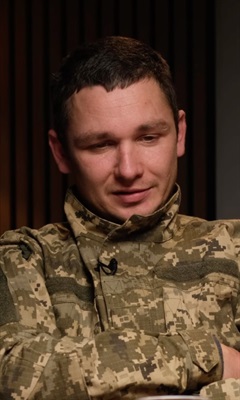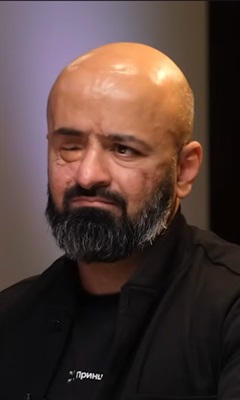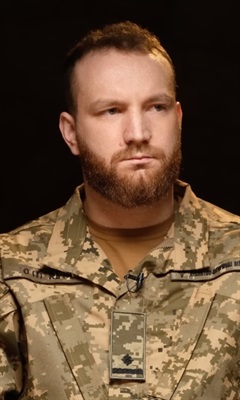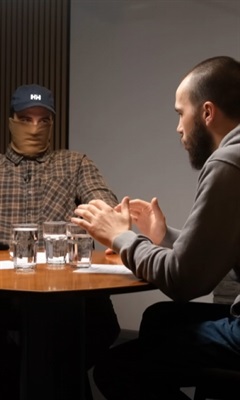Grad rockets were landing closer and closer. The evacuation of civilians from Luhansk oblast
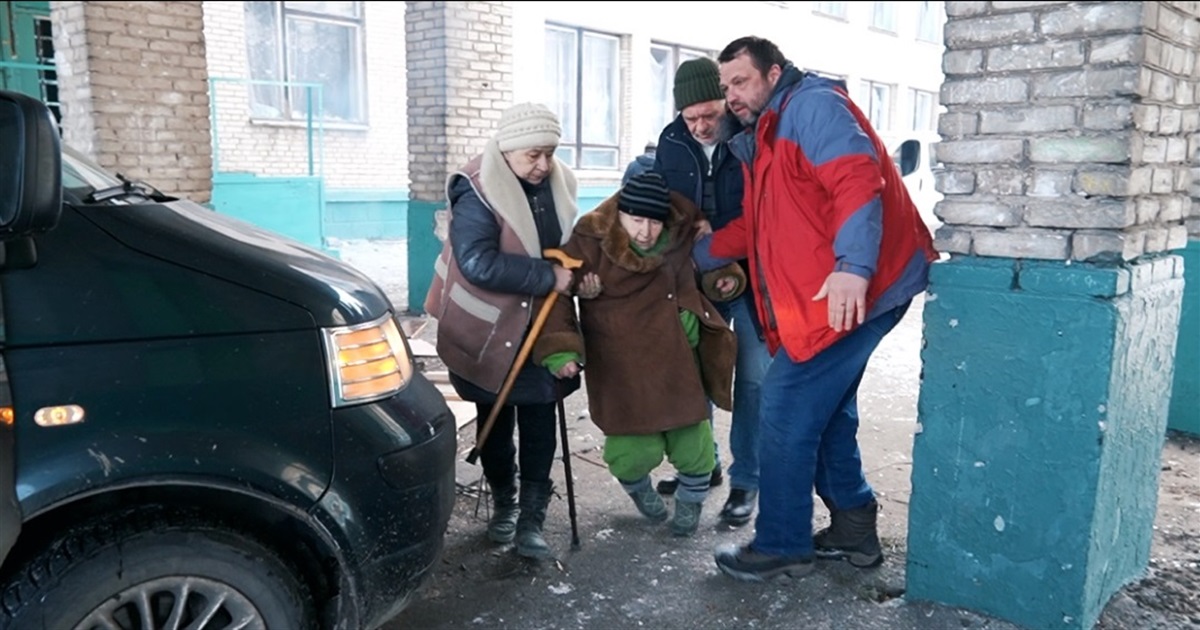
The shortest road
During the second week of Russia’s full-scale invasion into Ukraine, my client from a “former” peaceful life called me, he had ordered my services of video filming before. He said that the volunteer he was acquainted with was going from Slaviansk to Severodonetsk to evacuate people. He wanted to have it all filmed to show the donors that the money was spent on humanitarian aid and evacuation.
As it happened, this volunteer was Mykhailo Myshenin, who has been getting people out of hot spots since 2014. He had just come back from Volnovakha. The loading of bread was done first, followed by filling buses up with gas and a long drive along an empty road via endless checkpoints.
“Have you been to such places before? Because people behave in different ways,” Mykhailo asked me, to which I replied that indeed I had, though I didn’t quite understand which places he was talking about.
The closer we were to Severodonetsk, the more military machinery was on the roads and the stricter each vehicle was being inspected. At the exit from the city, there was an unbelievable traffic jam, at least three kilometers long, the front glass of each vehicle had a piece of paper with the words “Children”, “People” written on them, or just a piece of white cloth. Mykhailo was outraged, “Look how many cars are there. Each third car is empty. They could have taken out so many people.”
Indeed, there were hundreds of cars, leaving the city. Only our three buses were moving in the opposite direction, sometimes making way for military machinery. We planned our route by GPS not to get lost between houses, and it played a dirty trick on us.
The GPS decided that the shortest way to the center was through the forest, bypassing the city. Without any notice to military operations, which revealed themselves right in front of us – there was fighting in the forest. There were loud bangs somewhere very close, surprised soldiers were looking at us from their trenches. But we had just a few hundred meters left to the city and decided to go through, navigating around smoldering military machinery and the craters from the missiles that had recently exploded there.
I thought to myself, “How come? I survived in Slaviansk in 2014, stayed there from the first explosion to the last one, I heard and saw everything, why am I so scared now?”
That day, it took the volunteers two trips to take out about a hundred civilians.
People were taken out of the basements
On the second day, it was loud even in the proximity of Severodonetsk. The evacuation train was to start from Novozolotarevka station; the task was to bring as many people as possible to the very station. This was what our team set out to do, but the artillery work was heard somewhere in the suburbs; and under the unceasing cannonade, we were waiting for people at the evacuation spot for about an hour.
Having determined that the “pluses” and “minuses” were outside of the city boundaries, I slightly relaxed, and we were still waiting for the civilians, reluctantly coming out of their basements. I stayed in Severodonetsk and answered the questions of the people, who were coming, while the buses had their cycles of moving people to the train station. We had to wait for them for an hour, or even longer. By the evening, over a hundred people were getting cold at the evacuation spot, but we had enough time only to get back to Slaviansk.
The third frosty day was cheering us up with sunny weather which made us feel better despite the anxiety. An hour of a road, checkpoints, machinery, traffic jams at the exits – and there was Severodonetsk again. It was quiet that day, for some reason I was stressed out by it, and this reason revealed itself pretty soon.
While we were driving, there was a very loud noise centrally behind us. The bus was rocked by the blast wave; I was literally squeezed into the seat with horror, and I turned the camera on. The next volley was straight in front of us, into the five-storied building, and our line of cars turned into the yard immediately. The driver came out of the car, I followed him. The thundering sounds of the coming missiles deafened me; I was struck by panic, I wanted to hide anywhere as soon as possible, but Mykhailo was quietly walking upright to the drivers of other buses despite the volleys into the neighboring building, “Let’s wait for five minutes and see, and after the volleys let’s go on.”
Seeing his unshaken conviction, I felt a little bit better, though my mind was trying to escape with all its might, recollecting all the pieces of advice about the actions in case of the shelling, given on social networks. Everything inside me was screaming, “Lie down and close your head with your hands!”, “Find a shelter!”, “Hide behind at least two walls!”, “Don’t panic!”
Everything went quiet.
A few minutes later, I remembered about a working camera in my hands, but nothing was recorded because I had forgotten about the “Recording” button in those minutes.
The line of cars went to the school, the yard of which reminded of the lunar surface, and the building itself was half-ruined. The volunteers literally brought the people out of the basement. There were small children and even a baby among them. I was filming it all with a constantly nagging feeling that another shelling was due soon; the worst thoughts were flying in my head when hearing the remote volleys of “minuses”, but a loud noise of “pluses” somewhere to the side brought some relief – that was good, that was not for us. This is the cynical truth of the war. It was getting quieter with each kilometer away from Severodonetsk. The children were successfully evacuated.
An awful sound
The same day, two huge buses came for evacuation purposes, and I went with them to Severodonetsk once again, calming myself down with the news about the approved “green corridor” along the way. Indeed, it was unusually quiet in the city, there were many policemen at the evacuation spot, about twenty yellow buses, full of people already, and several empty ones, people carrying their suitcases were coming here fast from all sides. Our two volunteer buses had their doors open waiting for people to get in, we could relax and catch a breath. And then I suddenly heard the worst sound in my life – the city was shelled with Grads
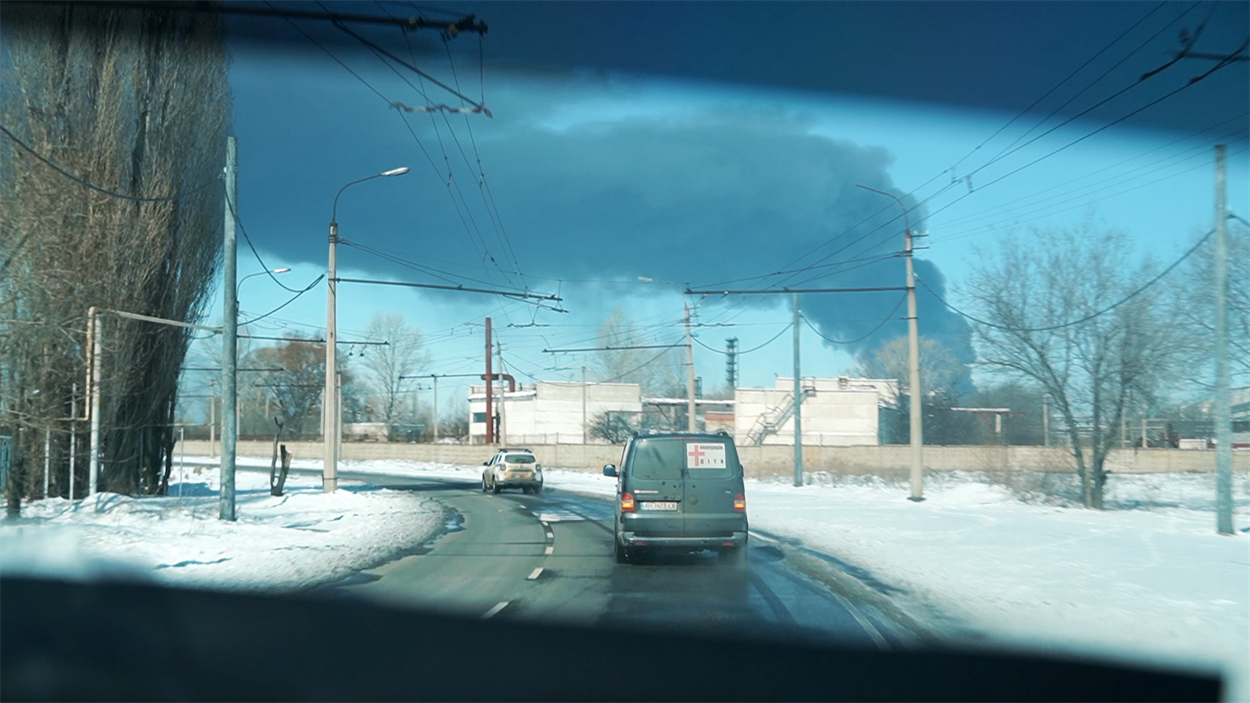
The air shuddered and hummed; severe blows shook the ground; a huge flock of frightened birds flew to the sky from behind the buildings, followed by a cloud of dust and smoke. The policemen were shouting to people, rapidly dispersing in horror, to bend down, and a partially empty line of buses was ordered to leave. Two huge volunteer buses left carrying no one.
I stayed with the driver in a small bus, but during the U-turn, we noticed an elderly lady with enormous suitcases. She was crying. The driver literally pushed her and her suitcases inside the bus, while she was begging to wait for her grandson, drying her tears and staring in the distance.
Finally, we saw a boy of about fifteen far away, running toward us at his top speed, with his father running at his side.
“Remember to write to me every half an hour, please. Go ahead, hold tight, man,” with these words the father hugged his son and closed the door of the bus behind him. The waiting for the grandson was over.
The Grads wouldn’t stop even when we were a relatively safe distance from the city. The following day, I didn’t go with the volunteers to get enough sleep and come to my senses.
No corridors
While I was watching the footage at home, in a quiet atmosphere, I thought that nothing bad had happened to me, and decided to film the shelling. To show it to others. As a result, my intention nearly cost me my life.
We were going to Rubizhne. As compared to Severodonetsk, the atmosphere was even more oppressive there – not a soul in sight, only the positions of the military, the tanks ready to fight, and the craters from the missiles. A police car was going ahead, guiding us along the city to the evacuation spot – slowly, in a monotonous and worrisome way.
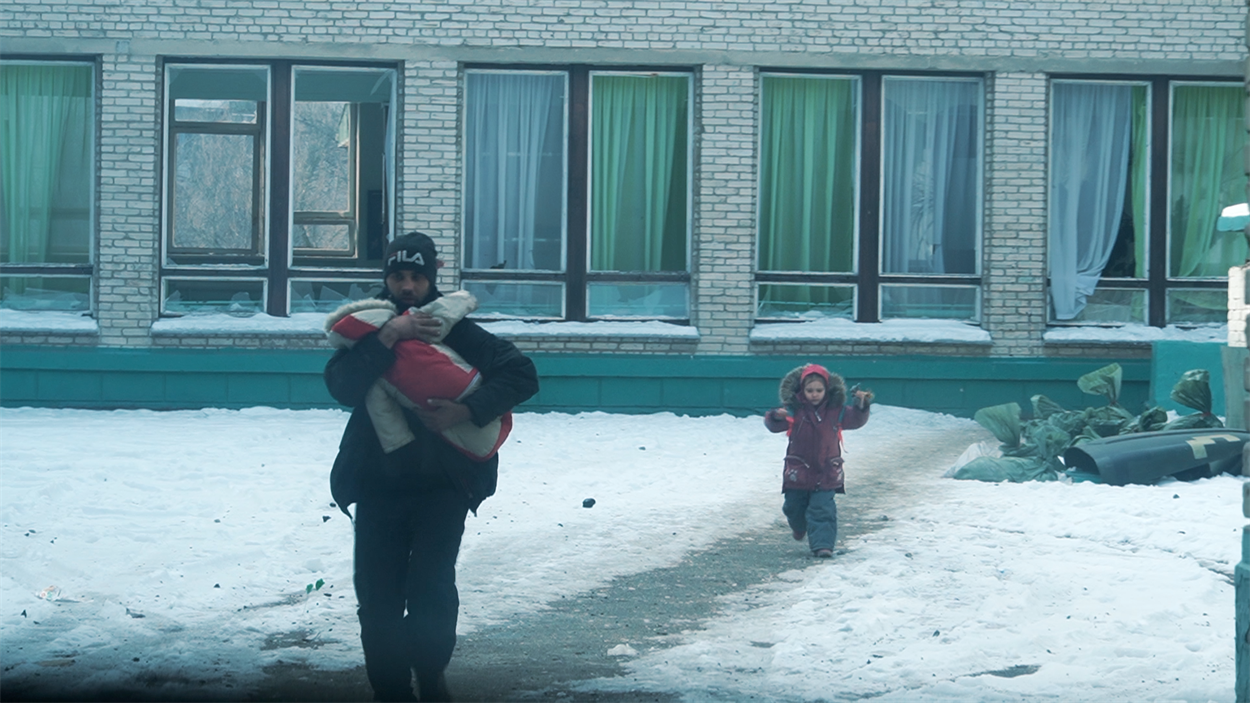
Suddenly there was a bang a hundred meters from us. I understood that it began, and horror-stricken, I felt a heavy lump in my throat. The next two “arrivals” were much closer, the line started moving faster. Then it banged right in front of the police car, and I bent down. The policemen started turning around, all the buses followed their example, but the shelling was just getting more severe – it seemed that the rockets were exploding right above our heads, the splinters were falling onto the roof, and the clods of roadside earth were flying into the windows.
It was a miracle that we survived, and we hid behind the buildings. The shelling was going further along the road, where we were supposed to go, and the policemen asked, “Did Haidai [the head of the Luhansk military administration – Svoi] actually give you permission for the evacuation? There are no corridors today!”
“There are never any corridors, but 150 people are waiting for us now and want to leave,” said Mykhailo.
“Usually this is followed by the infantry attack, there will be a ranged combat soon, and nothing for you to do here, don’t risk the lives of your people,” warned the policemen.
We were taken along the backyards out of Rubizhne to the neighboring Severodonetsk, which was relatively quiet, and people were also waiting for the evacuation. Two buses were filled in several minutes. A policeman came up to me and added, “There are no corridors, but people don’t know about it. If you get on the bus right now and tell them, the majority will run away for sure. Go faster, while there is no shooting.”
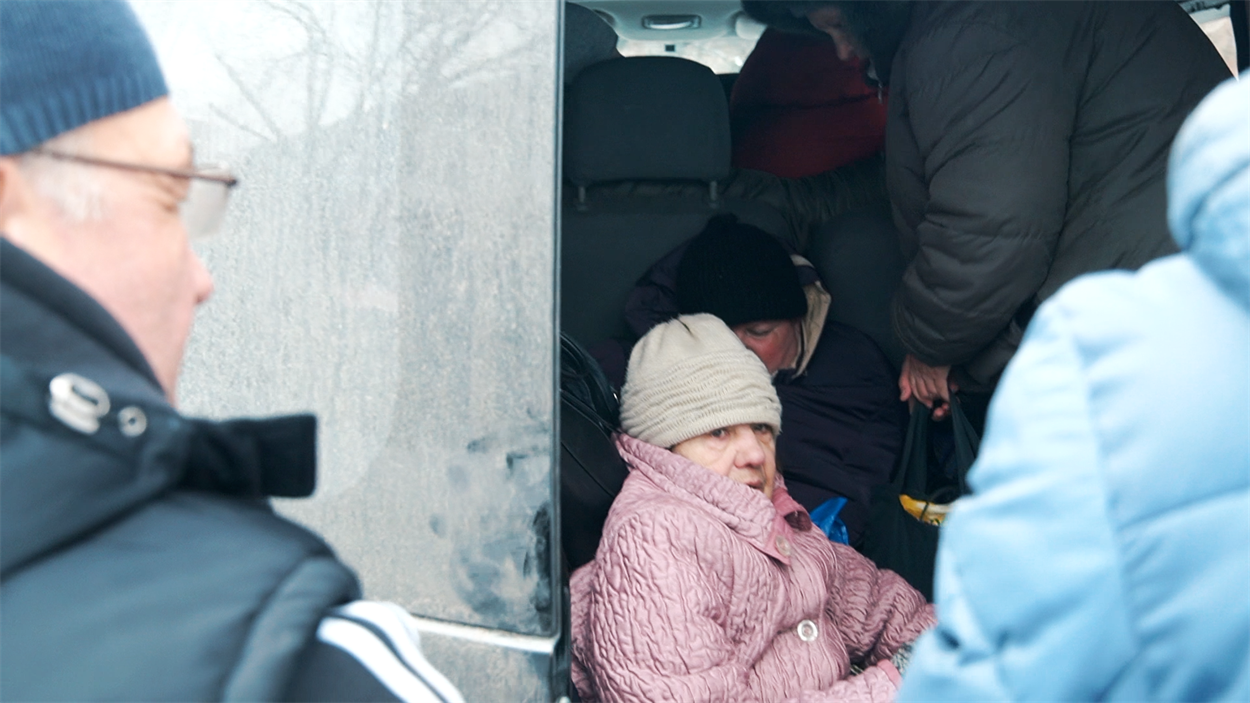
Mykhailo was going back to Rubizhne by a small bus, but I asked him to transfer me to the bus, leaving for Slaviansk, because my stock of courage was exhausted completely. He fulfilled my request with understanding and no further questions and went boldly on to save people.
A substitute for a conclusion
I have described a tiny fragment of the risk, the volunteers and civilians face during the evacuation from the frontline cities. If you are in doubt about whether you should leave or not, it is high time to make a decision. Are you willing to take a risk, when there might be no more safe possibilities for you to escape? Are you ready to risk the lives of the volunteers who might have to evacuate you from the epicenter of military actions?
The war is unpredictable, but if each coming day is getting worse at your place – don’t wait for any sudden improvement, save your life and the lives of those nearby, and the Ukrainian army will make sure that you come back home under peaceful skies.
P.S. I actually filmed my footage, bending on the first seat. After that, I had no desire to “catch” the shelling on my camera anymore.



